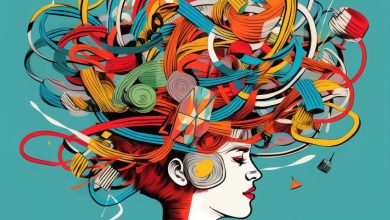MBTI Types and Depression: Who Struggles Most?

🎧 Listen to this Article 🎧
The Myers-Briggs Type Indicator, or MBTI, is a widely recognized tool for understanding individual personalities. In parallel, the field of mental health has gained significant importance, with conditions such as depression and anxiety impacting a substantial portion of the population.
Depression, in particular, is a complex and widespread mental health issue that requires careful attention and understanding. In this article, we aim to investigate MBTI depression, identifying most depressed MBTI.
MBTI Personality Types Overview
The Myers-Briggs Type Indicator, or MBTI, is a widely used system for understanding and categorizing personality traits. It’s based on four dichotomies that explore different aspects of our personalities:
- E/I (Extraversion/Introversion): This dichotomy assesses how people gain energy. Extraverts are typically outgoing and gain energy from social interactions, while introverts feel more recharged when they have alone time.
- N/S (Intuition/Sensing): This measures how we gather information. Intuitive types rely on abstract concepts and patterns, while sensing types tend to focus on concrete, tangible details.
- T/F (Thinking/Feeling): This dichotomy explores how we make decisions. Thinkers prioritize logic and objective analysis, while feelers make decisions based on personal values and emotions.
- J/P (Judging/Perceiving): This assesses our approach to the external world. Judging types prefer structure, organization, and planning, while perceiving types are more flexible and adaptable.
| Related: Exploring the Relationship between MBTI and Mental Illness
How Does Depression Affect Personality?

Depression can have a significant impact on an individual’s personality and overall emotional well-being. Here are some ways in which depression can affect personality:
Mood and Emotional Changes
- Depression often brings persistent feelings of sadness, hopelessness, and despair, which can overshadow one’s usual emotional range.
- Individuals with depression may become more irritable and easily frustrated, leading to strained relationships.
Changes in Behavior
- Depressed individuals often isolate themselves from social activities and relationships, even if they were typically outgoing or sociable.
- Hobbies and activities that were once enjoyable may lose their appeal, leading to a general lack of interest in life.
Cognitive Effects
- Depression can lead to feelings of low self-worth, self-criticism, and self-doubt, even in those who were previously confident.
- Many people with depression experience cognitive difficulties, such as trouble focusing, making decisions, and remembering things.
| Learn more: Depression and Work Performance | Strategies for Maintaining Productivity
Physical Symptoms
- Depression often results in persistent fatigue and low energy levels, affecting an individual’s motivation and ability to engage in daily activities.
- Some may experience changes in sleep patterns, such as insomnia or oversleeping, as well as appetite changes, including overeating or
Social and Relationship Impact
- Depressed individuals may be more prone to conflicts with loved ones due to their emotional state and withdrawal.
- Isolation can lead to a decline in social interactions, potentially impacting relationships and social support systems.
Risk-Taking Behaviors
Some individuals may engage in risky behaviors or substance abuse as a way to cope with their depression, temporarily numbing their emotional pain.
Hopelessness and Suicidal Thoughts
Depression can bring about profound feelings of hopelessness, and in severe cases, it may lead to suicidal thoughts or actions.
Do you know which Myers-Briggs personality types are prone to addiction?
Read to gain insights:
MBTI Addiction | Who is Most at Risk?
MBTI Depression: The Impact
Here are the way each MBTI personality type may interact with the experience of depression:
| Personality Type | Dominant Function | Strengths | Weaknesses | Example |
| ISTJ | Introverted Sensing | Organized, practical, problem-solving | Resistance to change, adaptability challenges | May find comfort in routines but resists trying new coping strategies. |
| ISFJ | Introverted Sensing | Compassionate, detail-oriented, supportive | Overcommitting to others, self-neglect | Prioritizes helping others through depression, sometimes at own expense. |
| INFJ | Introverted Intuition | Highly empathetic, creative, deep understanding | Idealism, perfectionism, self-criticism | Struggles with self-criticism and high self-standards during depressive episodes. |
| INTJ | Introverted Intuition | Analytical, strategic, logical approach | Emotional isolation, difficulty seeking support | Hesitates to discuss emotional struggles, prefers to work through them independently. |
| ISTP | Introverted Thinking | Problem-solving, adaptability, resilience | Emotional expression challenges, unhealthy coping | May struggle to articulate emotions, resort to unhealthy coping mechanisms. |
| ISFP | Introverted Feeling | Emotional depth, self-awareness, creativity | Self-criticism, self-doubt, particularly in creative endeavors | Uses art/music for emotional expression but may wrestle with self-doubt. |
| INFP | Introverted Feeling | Empathy, creativity, authenticity | Emotional intensity, instability, self-doubt | Experiences moments of intense emotions, struggles to maintain emotional equilibrium. |
| INTP | Introverted Thinking | Analytical, innovative, logical thinking | Emotional expression challenges, emotional distancing | Prefers intellectual analysis to emotional communication during depression. |
| ESTP | Extraverted Sensing | Action-oriented, adaptability, resilience | Emotional avoidance, reluctance to process depression | Might engage in risky behaviors to escape depression without addressing underlying causes. |
| ESFP | Extraverted Sensing | Emotional expressiveness, responsiveness, creativity | Maintaining consistent coping strategies may be challenging | Responsive to social feedback, intensifying emotional impact of depressive episodes. |
| ENFP | Extraverted Intuition | Empathy, creativity, open to exploring therapies | Maintaining consistent self-care routines may be challenging | Enthusiastically tries various coping strategies but struggles with implementation consistency. |
| ENTP | Extraverted Intuition | Analytical, innovative, adaptability | Emotional chaos, procrastination, inaction | Generates many ideas for managing depression but struggles to focus and follow through on one. |
| ESTJ | Extraverted Thinking | Organized, proactive, practical problem-solving | Emotional expression may be limited, lack of empathy | Approaches depression as a problem to be solved, focuses on practical solutions. |
| ESFJ | Extraverted Feeling | Compassion, supportiveness, nurturing | Overcommitment to others, self-neglect | Focuses on caring for others while neglecting self-care, potentially intensifying depressive symptoms. |
| ENFJ | Extraverted Feeling | Empathy, sensitivity, harmony maintenance | Overcommitment to others, neglecting own well-being | Prioritizes helping others through depression, occasionally at the expense of own mental health. |
| ENTJ | Extraverted Thinking | Strategic, proactive, leadership skills | Limited emotional expression, reluctance to seek support | Focuses on finding solutions to depression, is less expressive about emotional struggles. |
The Most Depressed MBTI Personalities
It’s essential to note that the likelihood of experiencing depression is not solely determined by one’s MBTI personality type. However, certain personality traits and tendencies may impact how individuals cope with or respond to depression. Here’s a general list of 6 most depressed MBTI types:
- INFP: High emotional sensitivity and introspection can lead to intense emotional experiences. (The complete article: INFP Personality and Depression)
- ISFP: Emotional depth and self-awareness can make them prone to self-criticism during depressive episodes.
- INFJ: Idealism and perfectionism may contribute to self-criticism during depression. (The complete article: INFJ Depression)
- ENFP: Intense emotions and instability can make depression management challenging.
- ESFP: Emotional responsiveness may intensify emotional experiences during depression.
- ISTP: Difficulty with emotional expression may lead to unhealthy coping mechanisms.
Coping Strategies

Coping strategies for depression can vary greatly depending on an individual’s personality and unique needs:
For INFP
- Engaging in creative activities like art, writing, or music can help process emotions.
- Keeping a journal to express and reflect on feelings and thoughts can provide emotional release.
For ISFP
- Practicing self-compassion and self-care to counteract self-criticism.
- Using mindfulness techniques to stay present and manage intense emotions.
For INFJ
- Seeking professional therapy to address perfectionism and self-criticism.
- Connecting with empathetic friends and confidants for emotional support.
For ENFP
- Trying different therapeutic approaches to find what works best.
- Establishing consistent daily routines to maintain emotional stability.
For ESFP
- Openly sharing emotions with trusted friends and family.
- Engaging in physical activities and hobbies to release stress and emotions.
For ISTP
- Using analytical thinking to identify root causes of depression.
- Considering therapy to improve emotional expression and coping mechanisms.
Discover self-care practices to overcome depression: Top 10 Self-Care Practices for Depression
For Other Personality Types
- Regardless of personality type, therapy, such as cognitive-behavioral therapy (CBT) or dialectical behavior therapy (DBT), can be highly effective in treating depression.
- Practicing mindfulness and meditation to increase self-awareness and reduce emotional distress.
- Maintaining a healthy lifestyle with regular exercise, a balanced diet, and adequate sleep to support overall mental health.
- Building a strong support network of friends and family for emotional support and connection.
- In some cases, medication prescribed by a mental health professional may be necessary and beneficial.
Discover…
HealWiser’s Last Piece of Advice
If you think you are struggling depression, regardless of being one of the most depressed MBTI, as it may perpetuates stigma and misunderstanding, reach out for assistance; help is available for all. Have self-compassion, lean on a support network, and explore coping strategies that resonate with you. Your well-being is paramount, and there’s hope for recovery. Don’t hesitate to seek the aid you deserve.
Sharing your experiences can provide valuable insights and emotional support. So…
…share your story with HealWiser and others in the comments section below this post.






